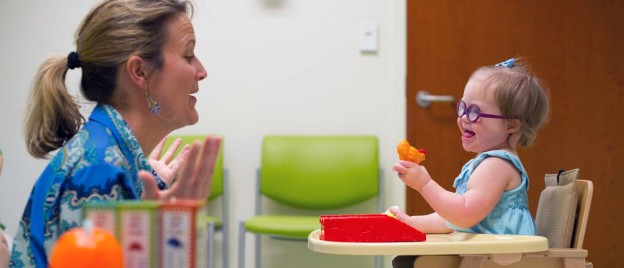Music as Communication within Families
Informant information:
Mary Kate resides in Andover, Massachusetts. She has a daughter who has an undiagnosed developmental disorder. Her daughter is nine years old and participates in the” My Own Voice” choir, a choir for children with special needs in Andover.
Type of lore: Customary
Language: English
Country of Origin: United States of America
Social / Cultural Context:
Mary Kate and her husband Neal often sing to their daughter as a way to communicate with her. Other people in their daughter’s life use this technique as well, since her developmental disorder makes it more difficult for her to communicate using spoken language.
This use of music as a form of communication was something we found to be consistent across many families with children who have special needs.
Informant’s comments:
Music has always been used by many people in [our daughter’s] life to communicate and interact with her. As you do with all babies, Neal and I sang to [her] as we cuddled and held her close to sooth and help her sleep. [Her] grandmothers also did the same thing when holding her close. What is unique with [our daughter] is that even though she is almost 10 years old we still do the same thing.
[She] often times still drifts off to sleep with the “soothing ” tones of me or Neal (and trust me we cannot sing) in her ear. The songs vary based on her mood and how long we are singing. Neal and I both sing songs that we heard from our parent. We sing songs from movies and musicals right now Mary Poppins is a preferred choice. We make up songs to melodies that she knows and use current information to keep her engaged such as what happened that day or what is happening in the future. I even sing commercial ditties the oscar mayer wiener song is popular as is the oscar mayer bologna song.
Songs can be used as a reward as well. [She] has a token board at school and if she complies with the rules and expectations she receives positive marks throughout the day. If she receives enough checks she earns the opportunity to pick something from the treasure chest. When she gets in the car at parent pick up, if she has a good day (earned treasure chest) I sing this song… I’m proud of you. I’m proud of you. I hope that you are proud of you too! [Our daughter] loves this and beams while I am singing. Honestly, 99% of the tangible rewards from the treasure chest are forgotten and returned to school. She really is motivated by the song.
Collector’s comments:
We found this behavior of communicating through song to be a piece of customary folklore because it was something we saw consistently used across multiple families with children with special needs.
Because of the unique nature of certain developmental disorders, we saw the use of music to be an effective mode of communication between parents and their atypical children. This mode of communication is customary because of the way that parents of children with special needs share this technique with each other.
Tags/Keywords: Music, Communication, Custom, Special needs, family

